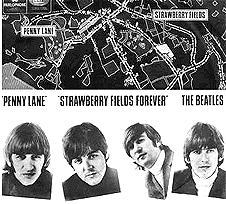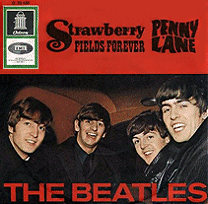Sixties
City presents
a wide-ranging series of
articles on all aspects of the Sixties, penned by the creator of the iconic
60s music paper Mersey
Beat
|
Sixties
City presents
a wide-ranging series of
articles on all aspects of the Sixties, penned by the creator of the iconic
60s music paper Mersey
Beat
|
|||||
|
  |
Parlophone
R5570, Produced by George Martin, features the song penned by Paul
in the autumn of 1966 when The Beatles had decided to make a concept album
inspired by their childhood in Liverpool. Digging into their memories,
Paul produced ‘Penny Lane’ and John composed ‘Strawberry Fields Forever’.
When the time came for the song to be recorded, Paul had the number completely
finished and had drafted out a rough arrangement for the brass section. Paul commented: “Penny Lane is a bus roundabout in Liverpool, and there is a barber’s shop showing photographs of every head he’s had the pleasure to know – no, that’s not true, they’re just photos of hairstyles, but all the people who come and go stop and say hello. There’s a bank on the corner, so we made up the bit about the banker in his motor car. It’s part fact, part nostalgia for a place, which is a great place, blue suburban skies as we remember it, and it’s still there". " And we put in a joke or two: ‘Four of fish and finger pie.’ The women would never dare say that, except to themselves. Most people wouldn’t hear it, but ‘finger pie’ is just a nice little joke about the Liverpool lads who like a bit of smut”. Incidentally, the barber’s shop was called Bioletti’s. In his biography, ‘Many Years From Now', Paul recalled, “It was all based on real things; there was a bank on the corner so I imagined the banker, it was not a real person, and his slightly dubious habits and the little children laughing at him, and the pouring rain. The fire station was a bit of poetic licence; there’s a fire station about half a mile down the road, not actually in Penny Lane, but we needed a third verse so we took that and I was very pleased with the line ‘It’s a clean machine'." |
 |
|
Paul was still not satisfied with the track and he was sitting at home watching
the BBC2 TV show ‘Masterworks’ with David Mason performing Bach’s Brandenberg
Concerto No.2 in F Major. He arranged for Mason to be hired to play trumpet
on the ‘Penny Lane’ track and was satisfied with the finished result. Recording
manager George Martin commented, “We had no music prepared. We just knew
that we wanted little piping interjections. As we came to each little section
where we wanted the sound, Paul would think up the notes he wanted and I
would write them down for David. The result was unique, something that had
never been done in rock music before, and it gave ‘Penny Lane’ a very distinct
character”. The number is one of the most uplifting and cheery of the Beatles' songs and caused problems in Liverpool with fans stealing the actual Penny Lane street signs. It was an act later to be repeated at Abbey Road and resulted in Liverpool Corporation ceasing to make street signs for Penny Lane, settling for painting the street name on buildings instead. It was suggested that Paul might have been inspired by Dylan Thomas’s poem ‘Fern Hill’, a nostalgic look at childhood, which Paul had been reading at the time. He composed the number on his piano at his Cavendish Avenue, St John’s Wood house. The piano had a psychedelic rainbow painted on it by David Vaughan of BEV. John Lennon helped him on the third verse. ‘Penny Lane’ was issued as a double ‘A’ side with ‘Strawberry Fields Forever’ on Parlophone R5570 on Friday 17th February 1967 when it became the first Beatles single since ‘Love Me Do’ not to hit the No.1 spot, being held at No.2 by the Engelbert Humperdinck hit ‘Release Me’. |
 |
|
Article
Text
UK
web hosting by
|